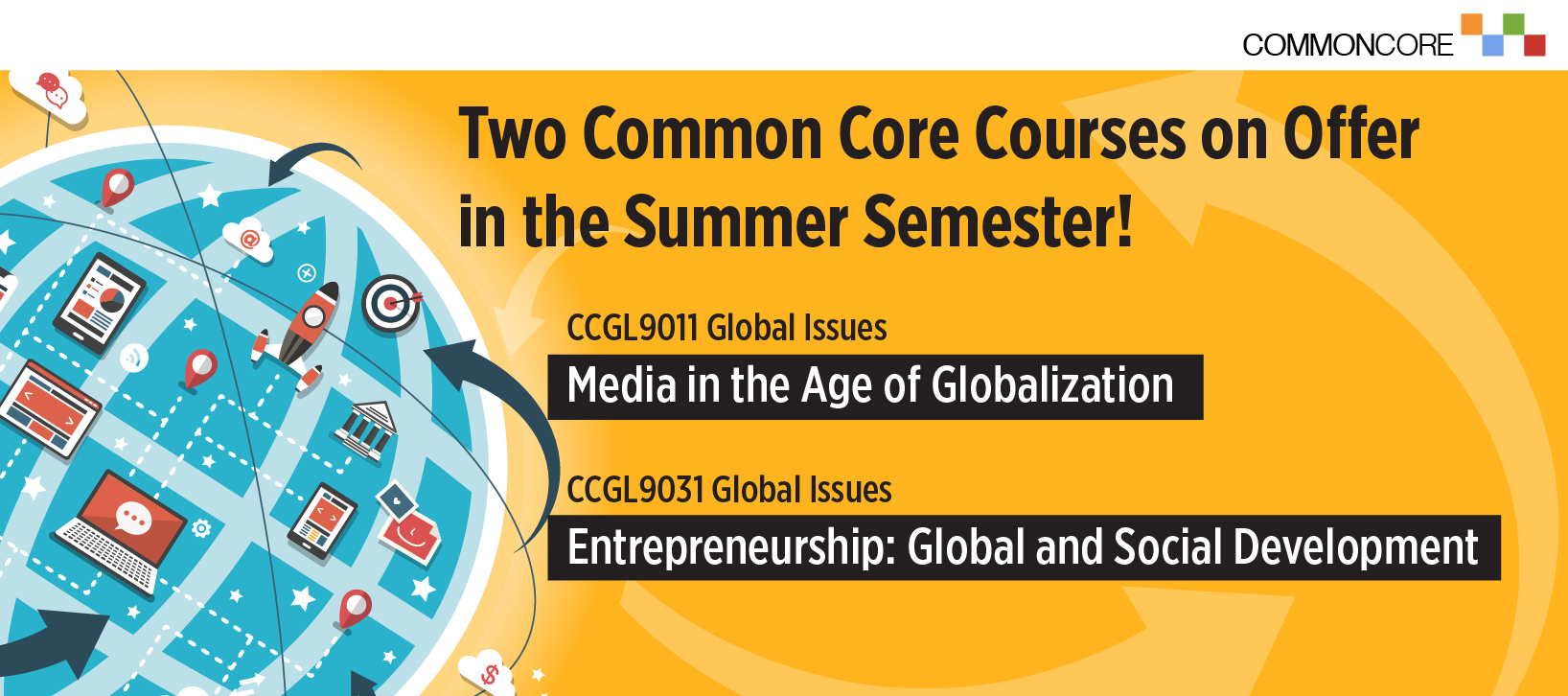Two Common Core Courses on Offer in the Summer Semester!

The Common Core (CC) Curriculum Committee is pleased to announce that two CC courses will be launched this summer, namely ‘Media in the Age of Globalization’ (CCGL9011) and ‘Entrepreneurship: Global and Social Development’ (CCGL9031). A summary of the course details of the two courses are at below.
In view of the shorter duration of the summer semester, the delivery mode of these two courses will be more condensed – lectures will be held two to three times a week and you will also need to attend tutorials as with CC courses offered in the regular semesters.
Who should take CC courses in the summer?
Taking CC courses in the summer would be ideal for you if you have taken less than 24 credits of CC courses in semesters 1 and 2 this year, AND:
- you have already successfully completed one CC course in the Global Issues AoI and you wish to take another course in the same AoI for the purpose of fulfilling the UG5 graduation requirements on the CC; OR
- you have not taken any courses in the Global Issues AoI and you wish to take a course in the Global Issues AoI this year for the purpose of fulfilling the UG5 graduation requirements on the CC (you may take both courses if you have taken less than 18 credits of CC courses in semesters 1 and 2 this year).
How to select the courses in the summer?
The SIS will be open for course selection during June 13 – 20, 2016 (please see http://aao.hku.hk/sy3/plan-of-study/important-academic-dates/ for details), and the course approval method is by auto-ballot.
Taking CC courses in the summer will give you relief from your heavy workload during the regular semesters and, since the summer courses are also open to overseas students, you will also have the opportunity to expand your cultural horizons and make new friends from around the world.
Make the Common Core your own and have a great summer!
 |
CCGL9011 Global IssuesMedia in the Age of Globalization |
Course Description
In this course, students will examine the role of the globalized media in shaping perceptions of global and local realities, the extent to which the growing access to information from around the globe fosters information sharing and citizen participation in public affairs. The course will also consider the extent to which an increasingly globalized and fragmented media system impacts on power balances in information flow, domestic information production and dissemination. Does media globalization simply amount to the triumph of capitalist consumerism and the media values and institutions associated with the western model of economic and social development? Is there a developing “culture war” between “Eastern” and “Western” media institutions and values? What is the role of Hong Kong, China and Asia in providing their own narratives in the global media? In a multipolar cultural world, how could citizens contribute to the global conversation on local and global issues? The course will also reflect on critical media-related values such as the freedom of expression, privacy and transparency.

Course Learning Outcomes
On completing the course, students will be able to:
- Demonstrate basic understanding of the global media system, in light of contending political, cultural and economic paradigms.
- Demonstrate basic understanding of the role of technology in the development of the global media system.
- Identify and demonstrate basic understanding of the mechanisms by which governments, and business interests influence the framing of news.
- Demonstrate basic understanding of the role of and impact of social media on the global dynamics of information flow and exchange.
- Demonstrate an awareness of the emergence of “new voices” in the global media.
- Demonstrate understanding of the issues of freedom of expression, privacy and transparency in relation to the global media.
Offer Semester and Day of Teaching
Summer Semester
June 27 – July 20, 2016 (Mon and Wed) 9:30 am – 12:20 pm
Study Load
| Activities | Number of hours |
| Lectures | 24 |
| Tutorials | 10 |
| Reading / Self-study | 44 |
| News and documentary viewing | 8 |
| Assessment: Group debate | 17 |
| Assessment: Group research project | 17 |
| Assessment: In-class test (incl preparation) | 12 |
| Total: | 132 |
Assessment Ratio: 100% coursework
| Assessment Tasks | Weighting |
| Class participation | 12 |
| Group debate | 18 |
| Group research project | 35 |
| In-class test | 35 |
Required Reading
Selections from:
- Bennett, W. L. (2011). News: The politics of illusion (9th ed.). New York: Pearson/Longman.
- Bremmer, I. (2013). Every nation for itself: Winners and losers in a G-zero world. New York: Penguin.
- Chan, J. M., Lee, C. C., Pan, Z., & So, C. Y. K. (2002). Global media spectacle: News war over Hong Kong. Hong Kong: Hong Kong University Press.
- MacKinnon, R. (2012). Consent of the networked: The world-wide struggle for Internet freedom. New York: Basic Books.
- Schiffrin, A., & Kircher-Allen, E. (2012). From Cairo to Wall Street: Voices from the global spring. New York: New Press.
- Seib, P. (Ed.). (2012). Al Jazeera English: Global news in a changing world (1st ed.). New York: Palgrave Macmillan.
- Tumbler, H. (2008). Journalism: Critical concepts in media and cultural studies. New York: Routledge.
Students are expected to read widely and stay up to date on current events and major news developments in Hong Kong, China and globally. Selections from newspapers, magazines, business school case studies, website references, and other teaching resources will be prepared using up-to-date sources for classes.
Required Websites
Recommended Reading
- Altschull, J. H. (1995). Agents of power: The media and public policy (2nd ed.). White Plains, NY: Longman Pub. USA.
- Herman, E. S., & Chomsky, N. (2002). Manufacturing consent: The political economy of the mass media. New York: Pantheon Books.
- Postman, N. (2005). Amusing ourselves to death: Public discourse in the age of show business. New York: Penguin Books.
- Rampton, S., & Stauber, J. C. (2003). Weapons of mass deception: The uses of propaganda in Bush’s war on Iraq. New York: Jeremy P. Tarcher/Penguin.
- Ravi, N. (2005). Looking beyond flawed journalism: How national interests, patriotism, and cultural values shaped the coverage of the Iraq War. Harvard International Journal of Press/Politics, 10(1), 45-62.
- UNESCO. (1978, November 28).Declaration on Fundamental Principles concerning the Contribution of the Mass Media to Strengthening Peace and International Understanding, to the Promotion of Human Rights and to Countering Racialism, Apartheid and Incitement to War (Document 20C/20 21). From http://www.unesco.org
Course Co-ordinator and Teacher(s)
| Course Co-ordinator | Contact |
| Dr K.W. Fu Journalism and Media Studies Centre, Faculty of Social Sciences |
Tel: 3917 1643 Email: kwfu@hku.hk |
| Teacher(s) | Contact |
| Dr K.W. Fu Journalism and Media Studies Centre, Faculty of Social Sciences |
Tel: 3917 1643 Email: kwfu@hku.hk |
 |
CCGL9031 Global IssuesEntrepreneurship: Global and Social Development |
Course Description
This course introduces entrepreneurship from historical, economical, global, and social perspectives. First, students will be introduced to the evolution of entrepreneurship ever since the ancient civilizations. Students will then learn the basic economic analyses of modern entrepreneurship. The course will help students to develop a historical and balanced view on entrepreneurship and its role in human society, particularly in economics. Further it will examine how globalization shapes the landscape of entrepreneurship. Students will be motivated to deepen their understanding of entrepreneurship and broaden their view of entrepreneurship in a global context. Lastly, students will be guided to think critically regarding the consequences of entrepreneurship and the impact of entrepreneurship on society and individuals. This course aims to provide a comprehensive understanding of entrepreneurship and expose students to the fundamental changes occurring in both the business community and overall society.

Course Learning Outcomes
On completing the course, students will be able to:
- Assess the global market and evaluate business and social opportunities from a novel point of view concurrent with the technological trends.
- Develop the awareness and understanding for the relevant social factors in different cultural environments.
- Evaluate the effectiveness of the social media tools in reaching different market segments and promoting social equality and justice.
Offer Semester and Day of Teaching
Summer Semester
July 19 – August 4, 2016 (Tue, Thur, and Fri) 2:30 pm – 5:20 pm
Study Load
| Activities | Number of hours |
| Lectures | 20 |
| Tutorials | 12 |
| Fieldwork / Visits / Guest speaker | 15 |
| Reading / Self-study | 20 |
| Assessment: Summaries and reports | 10 |
| Assessment: Group project and presentation | 20 |
| Assessment: Class participation/contribution | 10 |
| Assessment: In-class test (incl preparation) | 13 |
| Total: | 120 |
Assessment Ratio: 100% coursework
| Assessment Tasks | Weighting |
| Class participation and contribution | 10 |
| Summaries and reports | 25 |
| Project | 30 |
| In-class test | 35 |
Required Reading
Readings forthcoming
Recommended Reading
Selected chapters from:
- Bornstein, D., & Davis, S. (2010). Social entrepreneurship: What everyone needs to know. New York: Oxford University Press.
- Mycoskie, B. (2012). Start something that matters. New York: Random House.
- Partridge, D. (2015). People over profit. Nashville, TN: Nelson Books.
Recommended Websites
- CreateHK, The Government of the Hong Kong Special Administrative Region
- Cyberport, Hong Kong Cyberport Management Company Limited
- Entrepreneur Asia: Power Players, CNBC
- Entrepreneur Media, Inc
- Entrepreneurship.org, Ewing Marion Kauffman Foundation
- Inc.com
- InvestHK, The Government of the Hong Kong Special Administrative Region
- TechCrunch
Course Co-ordinator and Teacher(s)
| Course Co-ordinator | Contact |
| Dr R.M. McCann School of Business, Faculty of Business and Economics |
To be advised |
| Teacher(s) | Contact |
| Dr R.M. McCann School of Business, Faculty of Business and Economics |
To be advised |

